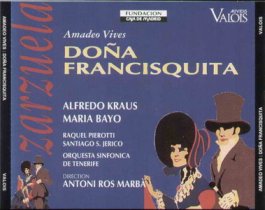Amadeo Vives - Dona Francisquita (1994)
Amadeo Vives - Dona Francisquita (1994)

Libretto by F. Romero and G.F. Shaw Disc: 1 1. Act 1. Scene 1 2. Act 1. Siempre es el amor play 3. Act 1. Passacaille et trio 4. Act 1. Cuando un hombre se quiere casar 5. Act 1. Canción de la juventud 6. Act 1. Cuando un hombre se quiere casar (fin de scène) 7. Act 1. Canción del ruiseñor 8. Act 1. Scène et finale du premier acte 9. Act 2. Scène et Cofradía de la Bulla 10. Act 2. Duo Disc: 2 1. Act 2. Romance. Por el humo se sabe play 2. Act 2. Duo 3. Act 2. Scène. Bella estrella, Quintete 4. Act 2. Scène et finale du deuxième acte 5. Act 3. Prélude et Coro de Románticos 6. Act 3. Scène 7. Act 3. Canción del Marabú 8. Act 3. Fandango play 9. Act 3. Duo 10. Act 3. Finale Dona Francisquita - Maria Bayo Fernando - Alfredo Kraus Aurora la Beltrana - Raquel Pierotti Cardona - Santiago Sánchez Jericó Doña Francisca - Rosa María Ysas Lorenzo Pérez - Ismael Pons Leñador - Emilio Sánchez Buhonera - María Luisa Maesso Sereno - Emilio Sánchez Irene la de Pinto - Mercedes Aleman Herrera Doña Liberata - Encarna Santana Hernandez Doña Basilisa - Beatriz Gonzalez Ramos Juan Andrés - Alfonso Lopez Raymond La Mama - María Luisa Maesso Torero - Juan Enrique Simo Pérez Miliciano - José Luis Alonso Romero Aguadora - Montse Pérez Rivero Naranjera - María Dolores Coello Jornalero - José Miguel Pérez Romero Su mujer - Sandra Ramos Orquesta Sinfónica de Tenerife Coro Polifonico de la Universidade de la Laguna Antoni Ros Marbà, 1993
Amadeo Vives (18 November 1871 – 1 December 1932) was a Spanish musical composer, creator of over a hundred stage works. He is also known by the Catalan form of his name, Amadeu Vives. He is best known for ‘Dona Francisquita’, which Christopher Webber has praised for its "easy lyricism, fluent orchestration and colourful evocation of 19th Century Madrid—not to mention its memorable vocal and choral writing" characterizes as "without doubt the best known and loved of all his works, one of the few zarzuelas which has 'travelled' abroad".
Those interested in opera and operetta sometimes turn a musical corner to come across an unexpected and welcome surprise. This is the case with Doña Francisquita. If a recording is to feature as one of the best, most original recordings then this is surely one. Some of the tracks are stunning, both a delight to listen to musically and in performance. The zarzuela (a Spanish form of light operetta with music, song and dance) originated at the Palace of La Zarzuela, near Madrid, where musical fiestas were regularly held in the 17th Century. The fashion for stage zarzuelas, which were often satirical in nature, grew in the mid-19th Century with composers like Arrieta, Barbieri, Bretón and Giménez, some of whose works already feature in the international CD catalogue. Of its genre this work by Vives is a particularly high-class example. Until now Vives as a composer has been unknown to me. Sadly little about his musical background is contained in the notes. We are told about his love of Catalonia and that he was Professor of Composition at the Madrid conservatory. He had an accident which caused semi-paralysis but the conservatory gave him assistance to complete the composition of the score. To what extent this help was made is unclear. We do know that Vives often insisted on writing the music before getting the lyricists to work out the words. Since he was Professor of Composition we can understand why the score contains such bright and catchy music with excellent orchestral texture. His score contains a wealth of musical ideas that turn in unexpected directions with temporary changes of key. The plot concerns a love affair between a student, Fernando, and the 'Francisquita' of the title. Although loved by Francisquita, Fernando ignores her advances, preferring to think he is in love with an actress from La Cruz Theatre. Humour presents itself when Francisquita is wooed by the student's father in front of her mother, where the mother mistakenly believes that it is she who is being wooed. Francisquita pretends to accept the elderly man's advances to make his son, her hopeful lover, jealous and win her affections. Another triangle exists where the actress taunts her other admirer, Lorenzo. A carnival follows where the actress sings a spirited pasacalle. This carnival proceeds across Act 2 and into Act 3, giving Vives an excuse to introduce some spectacular music. An amount of deception and double-dealing follows. All is resolved when the old man realises that he is too old as a match for Francisquita and so believes that his son should marry the girl instead. In the finale they all celebrate the forthcoming wedding. Vives' score is fresh and exciting, full of colour and the music flows well. He has an excellent feel for harmony and rhythm, providing subtle changes of key to add interest. Interestingly, the opening scene is musically of a different style being through-composed. One could be forgiven for thinking it carries more than a passing likeness to a passage by Puccini. ---Raymond J. Walker, musicweb-international.com
download: uploaded yandex 4shared mediafire solidfiles mega zalivalka filecloudio anonfiles oboom
Last Updated (Tuesday, 08 July 2014 16:02)








